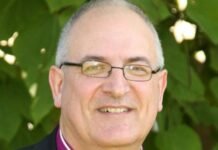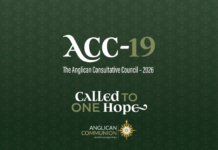Montreal Diocesan Theological College and the United Theological College are entering into a strategic alliance that will deepen and build on their long-standing collaboration in theological education. Following months of discussions among members of the Boards of Governors, the two colleges have begun an 18-month transition period in which they will explore and plan for the formation of a combined Anglican-United college in Montreal.
Over the course of the winter semester, UTC will complete the process of selling its building and wind down its independent operations. Starting in September 2021, UTC’s students and faculty will be incorporated into a United Church Studies program within the structure of Montreal Diocesan Theological College under the principalship of the Rev. Canon Jesse Zink.
United Church graduates of the college will be granted a testamur, which attests that they are academically qualified for ordination in the United Church of Canada. It is expected that the United Church Director of French leadership development will continue her work of French formation out of the United Theological College in collaboration with Montreal Diocesan Theological College. During this period, the college will continue to be known as the Montreal Diocesan Theological College—or more colloquially “Dio”—and the United Theological College will continue informally as “UTC at Dio.”
“For the past two years, the UTC board has engaged in a renewal of its mission and vision, and prayerfully considered options for a sustainable future,” said Ms. Patricia Evans, chair of the UTC Board. “In Dio, we have found a partner who shares our core values and is excited by our vision for theological education with a French-language component. We are confident we can work effectively together to serve our churches and the wider community.”
Dio and UTC have worked side by side for more than a century in an educational consortium now known as the Montreal School of Theology. MST also includes The Presbyterian College and is affiliated with McGill University. Students in all three colleges already study together in similar degree programs that combine coursework at McGill with in-depth ministry placements and ecumenical teaching of mission and ministry.
“God is constantly calling us in new directions,” said the Rt. Rev. Mary Irwin-Gibson, Bishop of Montreal and chair of Dio’s Board of Governors. “I welcome this deeper partnership as an indication of the way God is calling us to share the gospel in new ways in a changing world. I believe Dio has much to offer UTC students and know that Anglican students will benefit from what UTC has to offer, including its French-language programming.”
“It’s especially appropriate that we announce this alliance in the Week of Prayer for Christian Unity,” said the Rev. Maylanne Maybee, UTC’s interim principal. “This ecumenical venture shows what can happen when we respond with courage and creativity to the challenges before us. It promises a robust future for United theological education in Montreal and for French-language ministry in the broader church.”
This is not the first time that Anglican and United theological education will be located in the same building on University Avenue in Montreal. From 1966 to 1975, UTC rented space from Dio and its students lived in Dio’s residence. Following the end of ecumenical discussions between the Anglican Church of Canada and the United Church of Canada, UTC moved into its present building.
“Our two colleges share a vision that is rooted in preparing people for leadership roles in the church and world,” said the Rev. Canon Jesse Zink, Dio’s principal. “I am looking forward to building on the strengths of our institutions to serve the whole church in its witness to the world.”
“At The Presbyterian College, we welcome this collaboration of our Anglican and United Church partners,” said the Rev. Dr. Roland De Vries, Principal. “Our work at PC can only be strengthened when our partners are in as strong a position as possible.” Professor Garth Green, Director of McGill’s School of Religious Studies, offered words of congratulations. “This is good news for the School of Religious Studies and for the University!” said Green. “It is an elegant arrangement that preserves the ecumenical character of the Montreal School of Theology, and ensures that its virtues and values as a consortium remain in place.”
“I welcome this news from the United Theological College and Montreal Diocesan Theological College as they explore the possibility of becoming an Anglican-United Church College in Montreal,” said the Rev. John Young, executive minister of theological leadership for The United Church of Canada. “Both colleges have particular strengths that will enable ministry preparation in English and French and enhance the denominational cross-fertilization already present in Montreal.”
“I want to thank Principal Maybee for the persistence and clarity of her leadership over the last three years,” said Ms. Evans, the UTC Board chair. “She was asked to serve as principal for an interim period to help us strategize for the future. We are grateful for her faithful completion of this task, and we wish her well as she returns to her well-earned retirement once her term ends.”
The Montreal School of Theology was founded in 1914 as the Joint Board of Theological Colleges Affiliated with McGill University. The affiliation with McGill has been repeatedly renewed, most recently in 2016. The result is an educational partnership that is unique in North America: a leading research university and denominational colleges work together to offer theological education supported by in-depth ministry placements in the midst of Canada’s most vibrant, diverse, and pluralistic city. The consortium was recently reaccredited for 10 years by the Association of Theological Schools, who wrote that the partnership was a “unique collaboration of a public university and three theological colleges (in the midst of a multi-lingual, multi-cultural city) that provides for excellence in theological education.”



